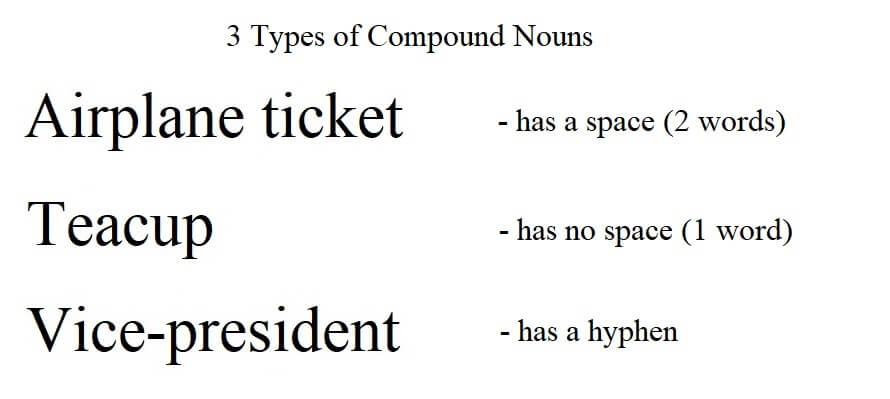Compound Noun
- Compound nouns are made up of two or more words that function as a single noun.
- There are three forms of compound nouns: closed form, open form, and hyphenated form.
- Examples include 'notebook' (closed form), 'ice cream' (open form), and 'mother-in-law' (hyphenated form).
Compound nouns are nouns that consist of more than one word. They can be formed in three ways, and each type plays a unique role in English. By the end of this lesson, you'll be able to identify and use these different types of compound nouns correctly.
What are Compound Nouns?
Compound nouns are words for things, places, or people that are made up of two or more words. These words are often combined to create a new meaning that's different from the original words alone.
There are three forms of compound nouns: closed form, open form, and hyphenated form.

Closed Form Compound Nouns
In closed form compound nouns, two words are joined together without a space or a hyphen. They appear as one word.
Examples include:
- Notebook
- Sunflower
- Keyboard
Examples:
-
She wrote her thoughts in her notebook.
Here, "notebook" is a compound noun combining 'note' and 'book' into one word.
-
A sunflower can grow very tall.
"Sunflower" combines 'sun' and 'flower' to describe a type of flower.
Open Form Compound Nouns
Open form compound nouns consist of two or more words that are usually written as separate words.
Examples include:
- Ice cream
- Post office
- Full moon
Examples:
-
I would like some ice cream.
In "ice cream," 'ice' and 'cream' are used together but written as separate words to describe a frozen dessert.
-
We went to the post office to send a package.
"Post office" is an open form compound noun referring to a place where postal services are provided.
Hyphenated Form Compound Nouns
Hyphenated form compound nouns include two or more words joined together by one or more hyphens.
Examples include:
- Mother-in-law
- Check-in
- Six-pack
Examples:
-
His mother-in-law is visiting next week.
"Mother-in-law" is a compound noun that describes the mother of someone's spouse, connected by hyphens.
-
We need to do the check-in before 3 PM.
"Check-in" involves a hyphen to combine 'check' and 'in', typically used in contexts like flights and hotels.
Practica este tema con el Tutor de inglés AI
AI English Tutor te enseñará la gramática y la practicará contigo en formato de conversación. Además, más de 100 preguntas de práctica sobre este tema para consolidar su comprensión.
Prueba ALULA gratis en tu teléfono o tableta








¿Tienes alguna pregunta sobre esta lección? Pregunta en la sección de comentarios, abajo.